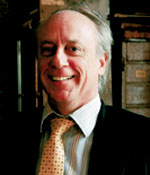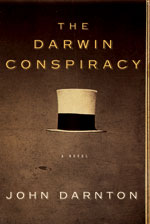Galley Girl: Charles Darwin is front page news now because of the intelligent design debate. Was he very controversial in his own time?
John Darnton: Yes. I think that's the secret of why he delayed so long in putting his theory before the public. And I think it's also partly the secret of why he always got a horrible stomachache every time the theory was to be debated, so he never showed up, wherever that was happening. He knew the implications of what he was doing. He knew he was challenging accepted Christian dogma. Maybe even his body rebelled against it. His wife Emma was, in fact, very devout, and wrote him a letter expressing sorrow at the thought that she would be living in heaven for all eternity, and he'd be somewhere else. He was going to be a man of the cloth himself, don't forget. He was going to be a country vicar, after he decided not to be a doctor, because he couldn't stand the sight of blood. But the key thing is, these arguments that we hear today about Intelligent Design were raised in his lifetime.
GG: Did Darwin at the end of his life have any religious beliefs himself?

JONATHAN PLAYER
John Darnton |
JD: No. He became progressively a nonbeliever, and that's part of what I admire about him. I think he just followed his intellect wherever it pointed. He was such a scientist to the marrow of his bones that he insisted on evidence and proof of more or less everything. When he was an old man, people used to write him letters from around the world, and sometimes traipse out to his village to meet him. Often would come the question, Are you a believer? By that point, over the age of 60, Darwin would say, No, I've seen no evidence of God. He even wrote somewhere that the religious impulse was just an instinct, like a monkey's fear of snakes. So he didn't mind really expressing his opinion forcefully.
GG: When did you get interested in Darwin?
JD: In 1996 when I was London bureau chief, I decided to do a story on Down House, which is 17 miles outside of London, in Kent. That's Darwin's country home, where he lived most of his life, and did all of his writing. I went to look at it. The place was just falling apart. The roof was leaking, there were mold stains on the bedroom ceilings, the greenhouse where he had done experiments with orchids was collapsing. They wanted a story done, primarily to bring in contributions. I was happy to oblige them. I got a wonderful tour; I was allowed to sit in Darwin's chair... Later, I thought, I didn't know any of these things about Darwin—his endless maladies, his problems with his stomach, the fact that he then never traveled again. I started thinking, what could have been behind all of this? Why did he have these odd symptoms. Most of all, why did he wait 22 years after he is thought to have conceived of the theory before he could actually write it? There have been so many biographies; we have a pretty good sense of what was going on. But I thought, wouldn't it be fun to invent something that could explain it if what you invent puts a new interpretation on everything?
GG: What are the rules when you're adding to actual facts? How free do you feel to invent?

PHOTO BY CAROL CARSON
|
JD: Very good question. Are there boundaries? If there are, I think I've crossed them. (Laughs.) Well, it is a work of fiction. So in theory, there are no rules. It's not a traditional historical novel, though. We often think of the term as an attempt to fill in small blank spaces, but otherwise remain totally true to the known facts. I changed it, in that I presented many, many historical facts. I estimate that about 90% of what's in the book is totally true, is accurate. All of the historical characters are real, in the sense that they lived. They by and large did most of the actions they're depicted as doing. Even some of the quotes are lifted from journals and biographies. But I took significant liberties in [a few] key areas knowingly and with malice of forethought that totally changed everything. The idea I had was, how interesting it is if you view a series of events and you turn the knob 10 degrees to one side, and you come out with a totally different interpretation that in some ways explains even better than so-called real history might be the case. So it's not an historical novel the way Antonia Fraser writes them, where you take all of the facts, and that's your spine and your skeleton and then you just add the flesh of imagined conversation. This is a very different thing.
